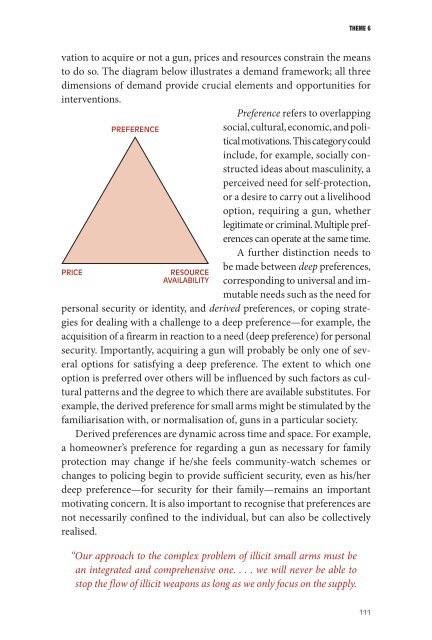MISSING PIECES - Inter-Parliamentary Union
MISSING PIECES - Inter-Parliamentary Union
MISSING PIECES - Inter-Parliamentary Union
Create successful ePaper yourself
Turn your PDF publications into a flip-book with our unique Google optimized e-Paper software.
THEME 6<br />
vation to acquire or not a gun, prices and resources constrain the means<br />
to do so. The diagram below illustrates a demand framework; all three<br />
dimensions of demand provide crucial elements and opportunities for<br />
interventions.<br />
Preference refers to overlapping<br />
PRICE<br />
PREFERENCE<br />
RESOURCE<br />
AVAILABILITY<br />
social, cultural, economic, and political<br />
motivations. This category could<br />
include, for example, socially constructed<br />
ideas about masculinity, a<br />
perceived need for self-protection,<br />
or a desire to carry out a livelihood<br />
option, requiring a gun, whether<br />
legitimate or criminal. Multiple preferences<br />
can operate at the same time.<br />
A further distinction needs to<br />
be made between deep preferences,<br />
corresponding to universal and immutable<br />
needs such as the need for<br />
personal security or identity, and derived preferences, or coping strategies<br />
for dealing with a challenge to a deep preference—for example, the<br />
acquisition of a firearm in reaction to a need (deep preference) for personal<br />
security. Importantly, acquiring a gun will probably be only one of several<br />
options for satisfying a deep preference. The extent to which one<br />
option is preferred over others will be influenced by such factors as cultural<br />
patterns and the degree to which there are available substitutes. For<br />
example, the derived preference for small arms might be stimulated by the<br />
familiarisation with, or normalisation of, guns in a particular society.<br />
Derived preferences are dynamic across time and space. For example,<br />
a homeowner’s preference for regarding a gun as necessary for family<br />
protection may change if he/she feels community-watch schemes or<br />
changes to policing begin to provide sufficient security, even as his/her<br />
deep preference—for security for their family—remains an important<br />
motivating concern. It is also important to recognise that preferences are<br />
not necessarily confined to the individual, but can also be collectively<br />
realised.<br />
“Our approach to the complex problem of illicit small arms must be<br />
an integrated and comprehensive one. . . . we will never be able to<br />
stop the flow of illicit weapons as long as we only focus on the supply.<br />
111
















